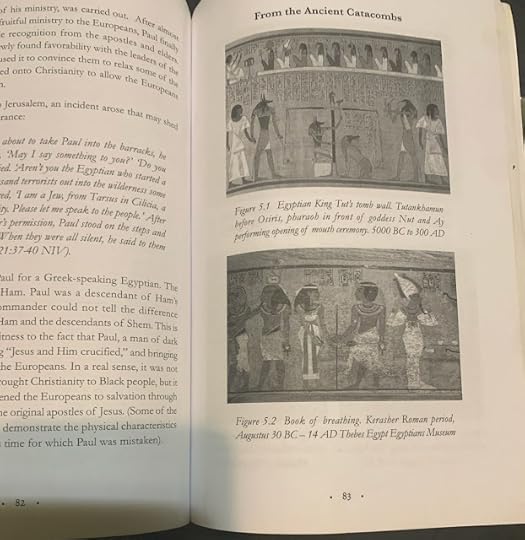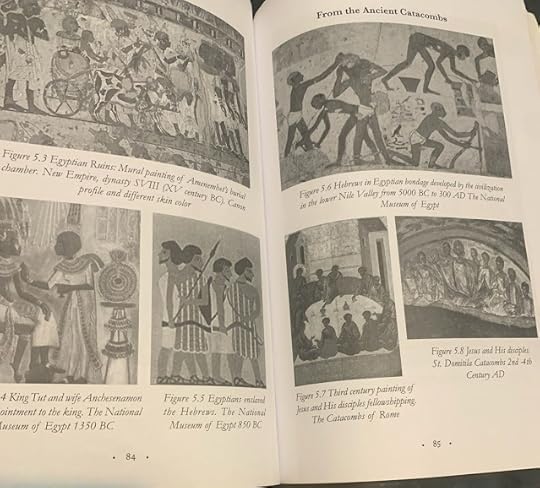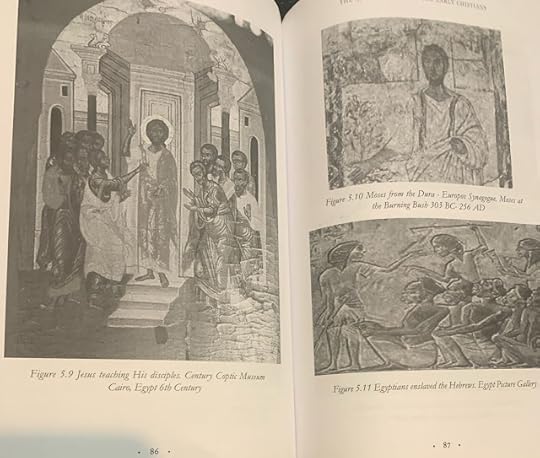Trey'von Knowles's Blog, page 20
March 29, 2025
Song: I Was Indigenous

Trey Knowles' "I Was Indigenous" explores the concept of humanity's original state as created by God—pure, in God's image, and in perfect fellowship with Him. The work delves into how individuals can remain in their "indigenous" state by not conforming to worldly ways and by embracing spiritual truths. It reflects on themes of spiritual identity and the challenges of staying true to one's divine purpose.The enemy comes to steal, kill, destroy, and knock people out of the indigenous state. Trey Knowles was Indigenous but what happened?
https://crosssides.blogspot.com/
Music: I Was Indigenous

Trey Knowles' "I Was Indigenous" explores the concept of humanity's original state as created by God—pure, in God's image, and in perfect fellowship with Him. The work delves into how individuals can remain in their "indigenous" state by not conforming to worldly ways and by embracing spiritual truths. It reflects on themes of spiritual identity and the challenges of staying true to one's divine purpose.The enemy comes to steal, kill, destroy, and knock people out of the indigenous state. Trey Knowles was Indigenous but what happened?
https://crosssides.blogspot.com/
March 27, 2025
Song: Democrat

Trey Knowles - Democrat
Democrat taking the morality of God away from our nation causes people to stumble by their evil temptation. Trey Knowles's song Democrat shows you how it is being done. Don't eat off the belly of the beast.
Therefore anyone who sets aside one of the least of these commands and teaches others accordingly will be called least in the kingdom of heaven, but whoever practices and teaches these commands will be called great in the kingdom of heaven. For I tell you that unless your righteousness surpasses that of the Pharisees and the teachers of the law, you will certainly not enter the kingdom of heaven. Matthew 5:19-20https://crosssides.blogspot.com/
March 26, 2025
Easter's Pegan Origin

Easter's origins are rooted in both pagan celebrations of the spring equinox and the Christian commemoration of Jesus' resurrection, with the word "Easter" potentially stemming from the Anglo-Saxon goddess Eostre.
Here's a more detailed look at the pagan influences on Easter:
1. The Goddess Eostre/Ostara:
The name "Easter" is believed to be derived from the Anglo-Saxon goddess Eostre, also known as Ostara, who was associated with spring, fertility, and rebirth.
Eostre's festival, celebrated around the spring equinox, marked the return of light and the beginning of new life.
The hare, a symbol of fertility, was often associated with Eostre, which may be the origin of the Easter bunny tradition.
The egg, another symbol of new life and rebirth, also became associated with Easter, possibly due to its connection to the goddess's festival.
2. Pagan Spring Festivals:
Many ancient cultures celebrated spring festivals to mark the return of life after winter.
These festivals often involved rituals, feasts, and offerings to deities associated with fertility and renewal.
The spring equinox, a time of balance between day and night, was a significant marker for these celebrations.
As Christianity spread, many of these pagan customs and traditions were incorporated into Christian festivals, including Easter.
3. The Christian Connection:
The Christian celebration of Easter commemorates the resurrection of Jesus, which is seen as a symbol of new life and victory over death.
The timing of Easter, which falls on the Sunday after the first full moon following the spring equinox, reflects the Christian connection to the spring season.
While the Christian meaning of Easter is central to its celebration, the holiday's traditions and symbols have a rich history rooted in pagan spring festivals.
https://crosssides.blogspot.com/Avatar Now Story

Trey Knowles - Avatar Now Story
"Avatar Now Story" Trey Knowles tells Afroasiatic Avatars an ancient allegory story about V.https://crosssides.blogspot.com/
Is the United Arab Emirates Destroying Islamic Morality? by Shahid Bolsen
Indigenous Ancient Photos

Acts 21:37-39 Paul Speaks to the Crowd
37 As the soldiers were about to take Paul into the barracks, he asked the commander, “May I say something to you?”“Do you speak Greek?” he replied. 38 “Aren’t you the Egyptian who started a revolt and led four thousand terrorists out into the wilderness some time ago?”39 Paul answered, “I am a Jew, from Tarsus in Cilicia, a citizen of no ordinary city. Please let me speak to the people.”
Romans 11:1I ask then: Did God reject his people? By no means! I am an Israelite myself, a descendant of Abraham, from the tribe of Benjamin.
Paul’s Anguish Over Israel Romans 9: 1-49 I speak the truth in Christ—I am not lying, my conscience confirms it through the Holy Spirit— 2 I have great sorrow and unceasing anguish in my heart. 3 For I could wish that I myself were cursed and cut off from Christ for the sake of my people, those of my own race, 4 the people of Israel.


https://crosssides.blogspot.com/
Afro-Asiatic Languages

Afro-Asiatic Languages by Trey Knowles
The Aramaic name for Jesus is "Yeshua" (ישוע), which is a shortened form of the Hebrew name "Yehoshua" (יהושע), meaning "Yahweh is salvation" or "Yahweh saves".
Aramaic is a group of Semitic languages with a history spanning millennia in the Middle East, serving as a lingua franca for various empires and continuing to be spoken by small communities today, with both eastern and western varieties.
Influence on Writing Systems:
The Aramaic alphabet is the basis for the modern Hebrew alphabet, and it has influenced the development of other alphabets like Syriac and Arabic.
Religious Importance:
Aramaic played a significant role in Judaism, Christianity, and Gnosticism, serving as a language of divine worship and religious study.
Language of Jesus:
Some scholars believe that Aramaic was the language spoken by Jesus.
The Afroasiatic Languages (also known as Afro-Asiatic, Afrasian, Hamito-Semitic, or Semito-Hamitic) are a language family (or "phylum") of about 400 languages spoken predominantly in West Asia, North Africa, the Horn of Africa, and parts of the Sahara and Sahel. Over 500 million people are native speakers of an Afroasiatic language, constituting the fourth-largest language family after Indo-European, Sino-Tibetan, and Niger–Congo. Most linguists divide the family into six branches: Berber, Chadic, Cushitic, Egyptian, Omotic, and Semitic. The vast majority of Afroasiatic languages are considered indigenous to the African continent, including all those not belonging to the Semitic branch.
Arabic is by far the most widely spoken within the family, with around 300 million native speakers concentrated primarily in the Middle East and North Africa. Other major Afroasiatic languages include the Cushitic Oromo language with 45 million native speakers, the Chadic Hausa language with over 34 million, the Semitic Amharic language with 25 million, and the Cushitic Somali language with 15 million. Other Afroasiatic languages with millions of native speakers include the Semitic Tigrinya language and Modern Hebrew, the Cushitic Sidama language, and the Omotic Wolaitta language, though most languages within the family are much smaller in size.
There are many well-attested Afroasiatic languages from antiquity that have since died or gone extinct, including Egyptian and the Semitic languages Akkadian, Biblical Hebrew, Phoenician, Amorite, and Ugaritic. There is no consensus among historical linguists as to precisely where or when the common ancestor of all Afroasiatic languages, known as Proto-Afroasiatic, was originally spoken.
However, most agree that the Afroasiatic homeland was located somewhere in northeastern Africa, with specific proposals including the Horn of Africa, Egypt, and the eastern Sahara. A significant minority of scholars argues for an origin in the Levant. Even the latest plausible dating for its proto-language makes Afroasiatic the oldest language family accepted by contemporary linguists.Reconstructed timelines of when Proto-Afroasiatic was spoken vary extensively, with dates ranging from 18,000 BC to 8,000 BC.
Comparative study of Afroasiatic is hindered by the massive disparities in textual attestation between its branches: while the Semitic and Egyptian branches are attested in writing as early as the fourth millennium BC, Berber, Cushitic, and Omotic languages were often not recorded until the 19th or 20th centuries.
While systematic sound laws have not yet been established to explain the relationships between the various branches of Afroasiatic, the languages share a number of common features. One of the most important for establishing membership in the branch is a common set of pronouns.
Other widely shared features include a prefix m- which creates nouns from verbs, evidence for alternations between the vowel "a" and a high vowel in the forms of the verb, similar methods of marking gender and plurality, and some details of phonology such as the presence of pharyngeal fricatives. Other features found in multiple branches include a specialized verb conjugation using suffixes (Egyptian, Semitic, Berber), a specialized verb conjugation using prefixes (Semitic, Berber, Cushitic), verbal prefixes deriving middle (t-), causative (s-), and passive (m-) verb forms (Semitic, Berber, Egyptian, Cushitic), and a suffix used to derive adjectives (Egyptian, Semitic).
https://crosssides.blogspot.com/March 25, 2025
The Matthew Project Chapter 5 - The Beatitudes

Matthew 5:3-12 The Beatitudes
He said:
3 “Blessed are the poor in spirit,
for theirs is the kingdom of heaven.
4 Blessed are those who mourn,
for they will be comforted.
5 Blessed are the meek,
for they will inherit the earth.
6 Blessed are those who hunger and thirst for righteousness,
for they will be filled.
7 Blessed are the merciful,
for they will be shown mercy.
8 Blessed are the pure in heart,
for they will see God.
9 Blessed are the peacemakers,
for they will be called children of God.
10 Blessed are those who are persecuted because of righteousness,
for theirs is the kingdom of heaven.
11 “Blessed are you when people insult you, persecute you and falsely say all kinds of evil against you because of me. 12 Rejoice and be glad, because great is your reward in heaven, for in the same way they persecuted the prophets who were before you.
https://crosssides.blogspot.com/March 24, 2025
Love Corrects Black American Behavior
Whoever loves discipline loves knowledge, but whoever hates correction is stupid. Proverbs 12:1.
The wicked are overthrown and are no more,but the house of the righteous stands firm. Proverbs 12:7.The wicked desire the stronghold of evildoers, but the root of the righteous endures. Proverbs 12:12.The way of fools seems right to them, but the wise listen to advice. Proverbs 12:15.A person’s riches may ransom their life, but the poor cannot respond to threatening rebukes. Proverbs 13:8.The teaching of the wise is a fountain of life, turning a person from the snares of death. Proverbs 13:14.Good judgment wins favor, but the way of the unfaithful leads to their destruction. Proverbs 13:15.All who are prudent act with knowledge, but fools expose their folly. Proverbs 13:16.https://crosssides.blogspot.com/



